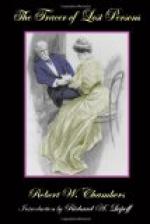“Tell me now,” she said, raising her eyes to his.
“Not now.”
“To-night?”
“I hope so. I will if I can, Miss Hollis.”
“But you must not fear to tell a physician about anything which troubles you, Mr. Carden.”
“I’ll remember that,” he said thoughtfully, as they emerged from the Park and crossed to Madison Avenue.
A moment later he hailed a car and they both entered.
CHAPTER XXIV
No, there could be no longer any doubt in her mind as she went into her bedroom, closed the door, and, unhooking the telephone receiver, called up the great specialist in rare diseases, Dr. Austin Atwood, M.S., F.B.A., M.F.H.
“Dr. Atwood,” she said with scarcely concealed emotion, “this is Dr. Rosalind Hollis.”
“How-de-do?” squeaked the aged specialist amiably.
“Oh, I am well enough, thank you, doctor—except in spirits. Dr. Atwood, you were right! He has got it, and I am perfectly wretched!”
“Who has got what?” retorted the voice of Atwood.
“The unfortunate young gentleman we saw to-day in the Park.”
“What park?”
“Why, Central Park, doctor.”
“Central Park! I haven’t been in Central Park for ten years, my child.”
“Why, Dr. Atwood!—A—is this Dr. Austin Atwood with whom I am talking?”
“Not the least doubt! And you are that pretty Dr. Hollis—Rosalind Hollis, who consulted me in those charity cases, are you not?”
“I certainly am. And I wanted to say to you that I have the unfortunate patient now under closest observation here in my own apartment. I have given him the room next to the office. And, doctor, you were perfectly right. He shows every symptom of the disease—he is even inclined to sentimentalism; he begins to blush and fidget and look at me—a—in that unmistakable manner—not that he isn’t well-bred and charming—indeed he is most attractive, and it grieves me dreadfully to see that he already is beginning to believe himself in love with the first person of the opposite sex he encounters—I mean that he—that I cannot mistake his attitude toward me—which is perfectly correct, only one cannot avoid seeing the curious infatuation—”
“What the dickens is all this?” roared the great specialist, and Dr. Hollis jumped.
“I was only confirming your diagnosis, doctor,” she explained meekly.
“What diagnosis?”
“Yours, doctor. I have confirmed it, I fear. And the certainty has made me perfectly miserable, because his is such a valuable life to the world, and he himself is such a splendid, wholesome, noble specimen of youth and courage, that I cannot bear to believe him incurably afflicted.”
“Good Heavens!” shouted the doctor, “what has he got and who is he?”
“He is Victor Carden, the celebrated artist, and he has Lamour’s Disease!” she gasped.




